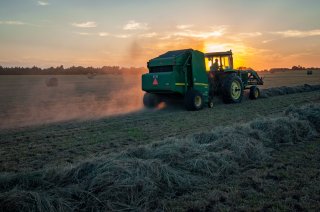 Jed Owen on Unsplash " fetchpriority="AUTO">
Jed Owen on Unsplash " fetchpriority="AUTO">
Knowledge Network on Sustainable Intensification (KNSI)
More yield with less pesticides, fertilizers and energy
How to raise agricultural yields with less environmental pollution? This is the main question of FACCE’s Knowledge Network Sustainable Intensification (KNSI). KNSI is an expert community of policymakers, research funders and scientists, led by a committee (think tank) consisting of 16 representatives of eight Northern European countries. The aim of the committee is to stimulate international collaboration on Sustainable Intensification (SI).
Innovation projects
Every country has its own policy plans, research themes, innovation projects and model farms, intended to modernize livestock and arable farming. The committee’s role is to map, compare and discuss these national initiatives, so that the network can formulate recommendations at national and European levels. For example: how could pilot farms in dairy or arable, sheep or cattle collaborate in the different countries? Are there knowledge-gaps that must be filled, or best-practices that have to be shared?
Boundaries of sustainable intensification
The KNSI Network (2016-2019) has already decided to focus on spatially targeted, site specific management - thus not on general rules for large areas. Two other chosen directions are: limited conversion of natural land for agricultural purposes, and returning agricultural land to ‘nature’ if the land is environmentally vulnerable. The committee is now creating a network of existing pilot farms. The members are also identifying key sustainability indicators that can be used to quantify the performances of these and other farms.
National activities
In March 2018, committee members have presented an inventory of national activities that could be used for follow-up steps. For example, the Irish Teagasc Farm Sustainability Report (funded by the DAFM Research Stimulus Fund) systematically links sustainability with productivity. The researchers have therefore used not only economic and environment indicators, but also social and innovation indicators. Social indicators included the quality of life for farmers, and the risk of isolation. And so are Finnish farmers supported by the OPAL LIFE project, a project that aims for more sustainable land use through a ‘land use optimization tool’, that must indicate suitable fields for intensive agriculture, extensive agriculture, forestry and their borderline cases.KNSI Network aims to broaden this inventory, and link to these and other international initiative on its website. It also wants to cooperate with the global organisation TempAg.
Outcomes of KNSI
The Knowledge Network has been set up as a novel instrument for transnational cooperation and its experiences and results will feed into the development of new instruments. KNSI had its kick-off meeting in Wageningen in June 2016 which was followed by a second meeting in London in October 2016. The final meeting of KNSI took place in Wageningen in June 2019. Cooperation through the KNSI Committee has led to several outcomes.